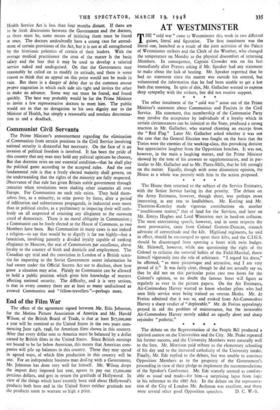AT WESTMINSTER
THE "cold war" came to Westminster this week in two different guises, literal and figurative. The first instalment was the literal one, launched as a result of the joint activities of the Palace of Westminster strikers and the Clerk of the Weather, who changed the temperature on Monday to the physical discomfort of returning Members. In consequence, Captain Crowder was on his feet immediately after Prayers asking if Mr. Speaker had any statement to make about the lack of heating. Mr. Speaker regretted that he had no statement since the matter was outside his control, but volunteered the information that he had been unable to get a hot bath that morning. In spite of this, Mr. Gallacher wanted to express deep sympathy with the strikers, but did not receive support.
* * The other instalment of the " cold war " arose out of the Prime Minister's statement about Communists and Fascists in the Civil Service. His statement, that membership of the Communist Party may involve the acceptance by individuals of a loyalty which in certain circumstances can be inimical to the State, produced a strong reaction in Mr. Gallacher, who started chanting an excerpt from the " Red Flag." Later Mr. Gallacher asked whether it was not the case that the General Election was fought on the basis that the Tories were the enemies of the working-class, this provoking derisive but appreciative laughter from the Opposition benches. It was not, however, in the main a laughing matter, and the Prime Minister showed by the tone of his answers to supplementaries, and in par- ticular to Mr. Gallacher and to Mr. Platts-Mills, that he felt strongly on the matter. Equally, though with some dissentient opinion, the House as a whole was patently with him in the action proposed.
* *
The House then returned to the subject of the Service Estimates, with the Senior Service having its due priority. The debate on the Army Estimates, however, though short, was perhaps more interesting, at any rate to landlubbers. Mr. Keeling and Mr. Thomton-Kemsley made vigorous contributions on another " troublesome matter," that of land for the Services, and later on Mr. Emrys Hughes and Lord Winterton met in head-on collision. The most entertaining speech, however, and in some respects the most provocative, came from Colonel Gomme-Duncan, staunch advocate of correctitude and the kilt. Highland regiments, he said in effect, should be encouraged to sport their kilts, and the C.I.G.S. should be discouraged from sporting a beret with twin badges. Mr. Shinwell, however, while not questioning the right of the Colonel to criticise the sartorial habits of the Field-Marshal, threw himself vigorously into the role of arbitrator. " I regard his dress," he affirmed, " as most picturesque and attractive, and I am very proud of it." It was fairly clear, though he did not actually say so, that he did not on this particular point care two hoots for the Colonel's opinion, so no doubt the famous beret will figure as regularly as ever in the picture papers. On the Air Estimates, Air-Commodore Harvey wanted to know whether pilots who had seen little service were being trained on veteran Moths. Mr. de Freitas admitted that it was so, and evoked from Air-Commodore Harvey a sharp verdict of "deplorable." Mr. de Freitas appealingly prayed in aid the problem of maintenance, but the inexorable Air-Commodore Harvey merely added an equally short and sharp rejoinder " pathetic."
* * * * The debate on the Representation of the People Bill produced a spirited contest on the Universities and the City. Mr. Peake repeated his former success, and the University Members were naturally well to the fore. Mr. Morrison paid tribute to the elementary schooling of his day and to the increased catholicity of the University intake. Finally, Mr. Ede replied to the debate, but was unable to convince Opposition Members as to the propriety of the Government's proceeding in view of their pledge to implement the recommendations of the Speaker's Conference. Mr. Ede scarcely seemed as comfort- able as usual and made—for him—a surprising lapse from logic in his reference to the 1867 Act. In the debate on the representa- tion of the City of London Mr. Assheton was excellent, and there were several other good Opposition speeches. D. C. W.-S.






























 Previous page
Previous page